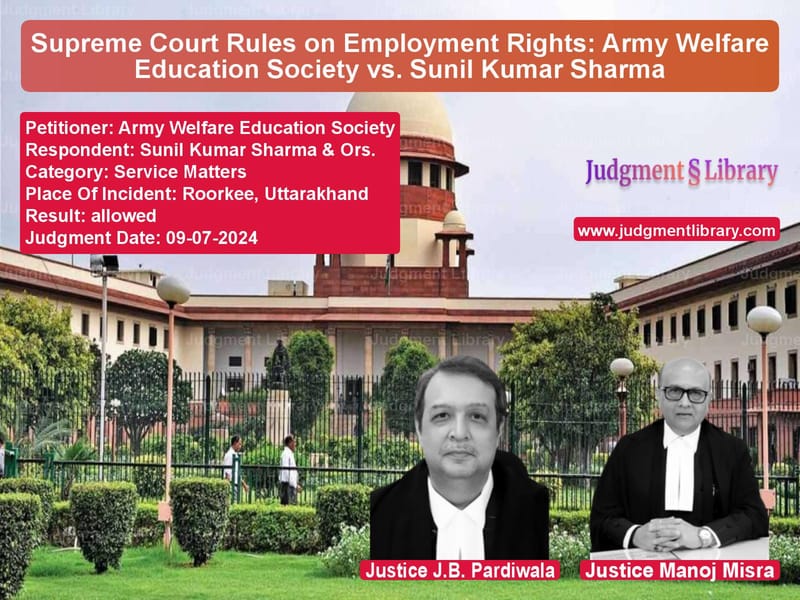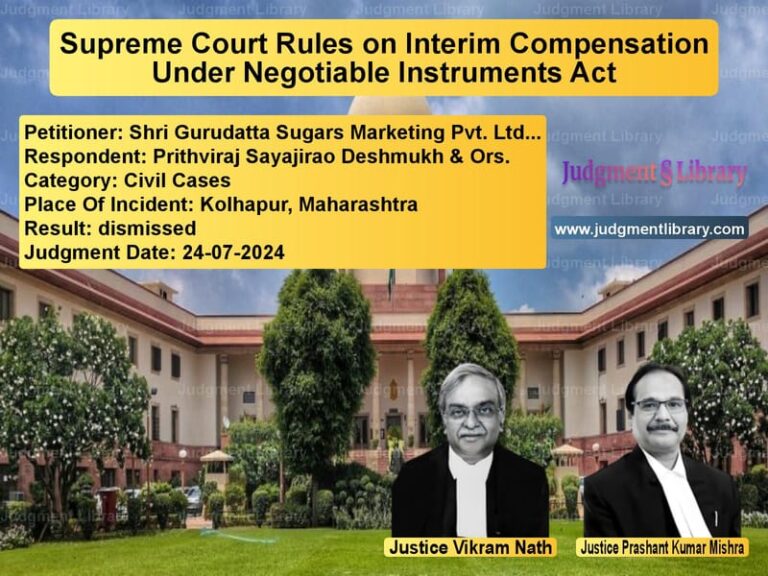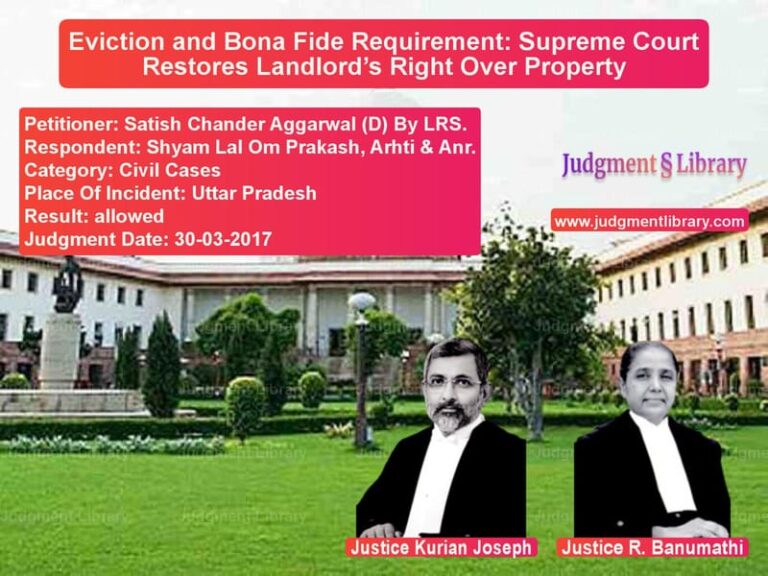Supreme Court Rules on Employment Rights: Army Welfare Education Society vs. Sunil Kumar Sharma
The Supreme Court of India recently delivered a crucial judgment in the case of Army Welfare Education Society vs. Sunil Kumar Sharma & Ors., addressing significant questions concerning employment rights, the applicability of public law principles to private institutions, and the scope of writ jurisdiction in service disputes. The judgment clarifies whether employees of private institutions can invoke writ jurisdiction under Article 226 of the Indian Constitution and whether such institutions can be classified as ‘State’ under Article 12.
Background of the Case
The dispute arose after the Army Welfare Education Society (AWES), a private educational society affiliated with the Indian Army, took over the management of St. Gabriel’s Academy in Roorkee, Uttarakhand. The takeover was necessitated by the expiry of the lease agreement between St. Gabriel’s Academy and the Ministry of Defence.
Several teachers and staff members who were previously employed at St. Gabriel’s Academy sought legal recourse when they were either terminated or reappointed under new terms and conditions that significantly altered their service benefits. They approached the Uttarakhand High Court, claiming that their service conditions should not be changed post-takeover and that AWES was bound to absorb them under the same employment terms.
The High Court ruled in favor of the employees, directing AWES to maintain their original service conditions. Dissatisfied with this ruling, AWES appealed before the Supreme Court.
Key Legal Issues Considered
- Whether AWES qualifies as a ‘State’ under Article 12 of the Constitution, making it subject to writ jurisdiction.
- Whether private contractual employment disputes can be adjudicated under Article 226 of the Constitution.
- Whether the doctrine of legitimate expectation applies to protect the service conditions of employees post-takeover.
- Whether AWES had a legal obligation to absorb employees from St. Gabriel’s Academy with the same employment benefits.
Arguments by the Appellant (Army Welfare Education Society)
AWES, represented by senior counsel, argued the following:
- AWES is a private society registered under the Societies Registration Act and is unaided by government funding.
- The employees in question were originally hired by St. Gabriel’s Academy, an unaided private institution, and had no legal or contractual claim against AWES.
- The High Court erred in treating AWES as a ‘State’ and assuming writ jurisdiction over what was essentially a contractual dispute.
- The takeover of the institution did not imply an automatic obligation to absorb its employees under existing terms.
- Employment in AWES institutions is governed by its internal regulations, and there was no statutory requirement to retain employees under previous conditions.
Arguments by the Respondents (Teachers and Staff Members)
The respondents, primarily former employees of St. Gabriel’s Academy, contended:
- AWES, though registered as a private body, functioned as a public authority since it was directly controlled by the Ministry of Defence and run by military personnel.
- AWES-affiliated institutions followed CBSE guidelines and government regulations, making them subject to public law obligations.
- The employees had a legitimate expectation that their service conditions would remain unchanged post-takeover.
- The abrupt change in employment terms violated natural justice and administrative fairness.
- The High Court correctly recognized that the employees had acquired vested rights and could not be arbitrarily terminated.
Supreme Court’s Analysis
The Supreme Court examined the issues in detail, focusing on the following key aspects:
1. Whether AWES is a ‘State’ under Article 12
The Court observed that while AWES performed educational functions for the children of military personnel, it was neither substantially financed nor controlled by the government in a manner that would justify its classification as a ‘State’ under Article 12. The Court noted:
“A private body does not become a ‘State’ merely because it serves a public function. Control by military personnel does not automatically convert a private entity into a state instrumentality.”
Thus, the Supreme Court ruled that AWES could not be considered a ‘State’ and was not subject to writ jurisdiction.
2. Writ Jurisdiction and Private Employment Disputes
The Court reiterated the principle that private employment disputes, unless involving statutory obligations, should not be entertained under Article 226. The Court emphasized:
“A writ petition cannot be a substitute for a civil suit. Service conditions of private employees must be adjudicated under labor laws and contractual frameworks, not constitutional remedies.”
Since AWES was not bound by any statutory obligation to absorb the employees of St. Gabriel’s Academy, their grievances did not warrant judicial review under writ jurisdiction.
3. Doctrine of Legitimate Expectation
The respondents argued that they had a legitimate expectation of continued employment under previous terms. However, the Court rejected this argument, stating:
“The doctrine of legitimate expectation cannot be applied to override contractual and regulatory conditions governing private employment. Expectations must be legally enforceable, not merely subjective beliefs.”
Therefore, the employees had no enforceable right to demand retention under previous terms.
4. Employer’s Right to Set Employment Terms
The Supreme Court ruled that AWES had the right to restructure employment terms post-takeover, provided it followed due process. The judgment clarified:
“An employer retains the discretion to set terms of employment unless restrained by statutory provisions. In this case, AWES was under no obligation to inherit previous contractual commitments.”
Final Verdict
The Supreme Court overturned the High Court’s decision and ruled in favor of AWES, holding that:
- AWES is not a ‘State’ under Article 12 and is not subject to writ jurisdiction in private employment disputes.
- The employees of St. Gabriel’s Academy had no automatic right to absorption under previous terms.
- The doctrine of legitimate expectation does not apply in purely private employment matters.
- Private institutions have the right to determine employment conditions unless otherwise restricted by statute.
Impact of the Judgment
- Clarity on Public Law Applicability: The ruling reinforces that private entities, even if associated with government institutions, are not necessarily ‘State’ actors.
- Limited Scope of Writ Jurisdiction: The judgment restricts the use of writ petitions in service disputes involving private employers.
- Protection of Employer Rights: The ruling affirms that private employers can set employment conditions within the limits of labor laws.
- Precedent for Educational Institutions: The case sets a precedent for private educational institutions regarding employee absorption policies.
Conclusion
The Supreme Court’s ruling in this case provides a clear demarcation between private and public employment disputes. By reaffirming that private educational institutions cannot be subjected to writ jurisdiction unless performing state functions, the Court has strengthened legal principles governing employer rights and employee expectations. The judgment will serve as a guiding precedent for similar employment-related disputes in the private education sector.
Petitioner Name: Army Welfare Education Society.Respondent Name: Sunil Kumar Sharma & Ors..Judgment By: Justice J.B. Pardiwala, Justice Manoj Misra.Place Of Incident: Roorkee, Uttarakhand.Judgment Date: 09-07-2024.
Don’t miss out on the full details! Download the complete judgment in PDF format below and gain valuable insights instantly!
Download Judgment: army-welfare-educati-vs-sunil-kumar-sharma-&-supreme-court-of-india-judgment-dated-09-07-2024.pdf
Directly Download Judgment: Directly download this Judgment
See all petitions in Employment Disputes
See all petitions in Contractual Employment
See all petitions in Termination Cases
See all petitions in Public Sector Employees
See all petitions in Recruitment Policies
See all petitions in Judgment by J.B. Pardiwala
See all petitions in Judgment by Manoj Misra
See all petitions in allowed
See all petitions in supreme court of India judgments July 2024
See all petitions in 2024 judgments
See all posts in Service Matters Category
See all allowed petitions in Service Matters Category
See all Dismissed petitions in Service Matters Category
See all partially allowed petitions in Service Matters Category







